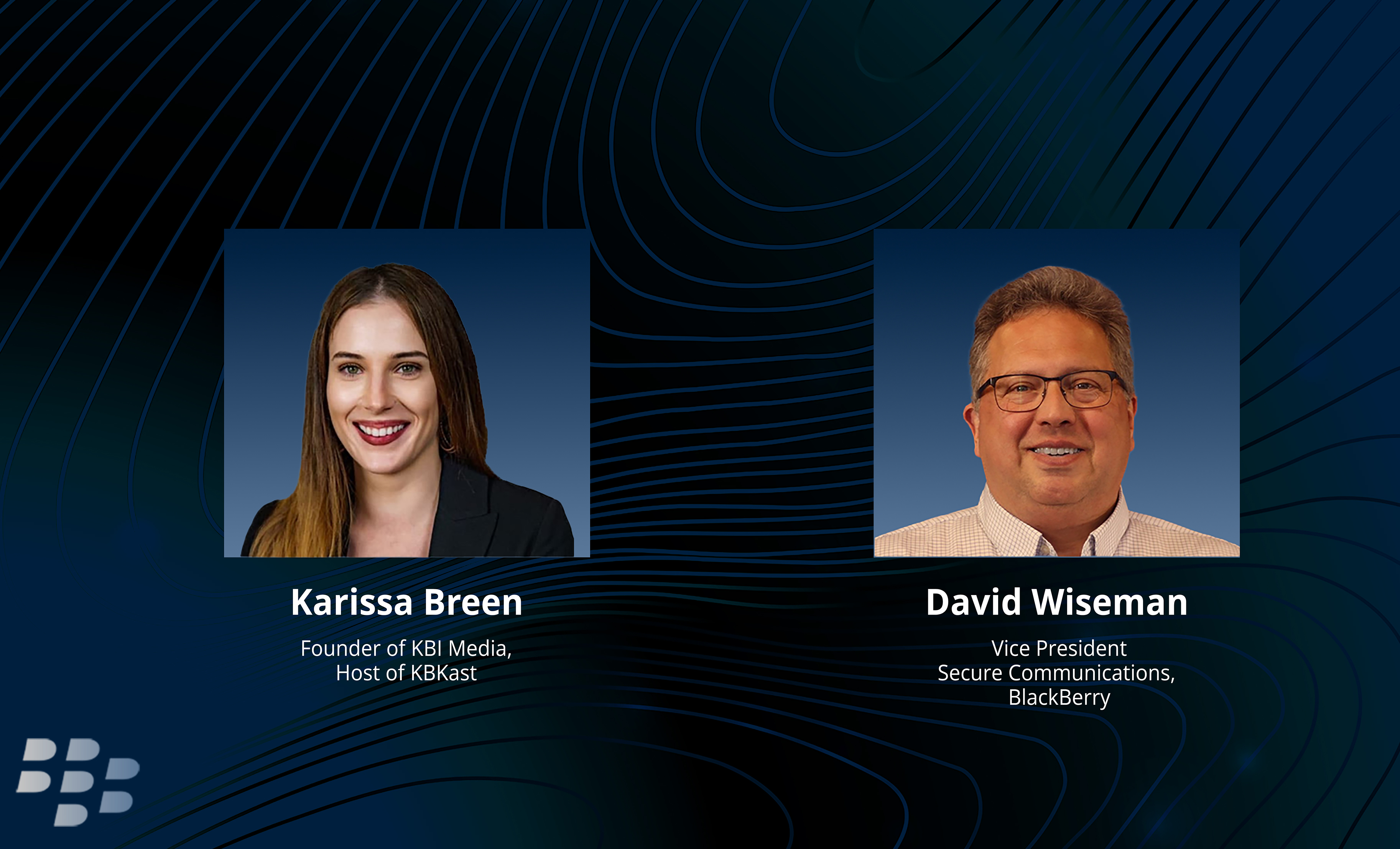The Eroding Trust in Consumer Messaging Apps
Effective communication is the backbone of any government operation. However, in an era of increasing cyber threats and heightened geopolitical tension, traditional communication methods are no longer sufficient. Government officials handling sensitive information need secure, sovereign, and reliable communication tools to protect national interests.
I recently spoke with the host of the KBKast podcast Karissa Breen to discuss the critical need for secure communication among government officials, the shortcomings of consumer-grade apps, and why advanced solutions like BlackBerry® SecuSUITE® are essential for safeguarding sensitive interactions. Keep reading for highlights or listen to the podcast episode in full.
BlackBerry's Mission
BlackBerry remains dedicated to securing communications — a mission we've maintained for four decades. While we no longer produce our iconic smartphones, we now provide software solutions for highly certified secure communications on Apple and Android devices. Our efforts focus on safeguarding communications from eavesdropping, interception, and attacks, which have become increasingly relevant due to recent security breaches and geopolitical risks.
Concerns With Consumer Messaging Apps
In our discussion, we covered the growing reliance of government officials on consumer apps like Signal, WhatsApp, and Telegram for critical communication. Recent headline-making leaks in the US government, where sensitive intel was exposed in a Signal group chat, are just the tip of the iceberg. While these apps may offer end-to-end encryption, they could come with significant risks, including:
Metadata Exposure: Even if messages are encrypted, metadata — e.g., who communicated with whom, when, and how often — is vulnerable and can be weaponized.
“Signal-gate” demonstrated consumer-grade encryption is not enough to safeguard the integrity of classified information. BlackBerry addresses these vulnerabilities with solutions that combine ease of use, strong encryption, and comprehensive data control.
The Importance of Digital Sovereignty
Digital sovereignty is the concept that organizations and governments should have full control over their communication systems, data, and users. BlackBerry enables such sovereignty by providing secure messaging and communications solutions tailored to specific government and enterprise needs. These solutions provide:
Usability vs. Security
A key challenge organizations face when adopting secure communications systems is balancing robust security demands and end-user convenience. Historically, overly complex systems have driven shadow IT solutions and reduced adoption. We recognize the need to make secure platforms feel as intuitive as consumer apps while maintaining essential security standards. This approach ensures user acceptance while safeguarding critical communications.
Identity and Deepfake Risks
The challenges associated with identity spoofing and deepfake technologies are growing. Threat actors increasingly use metadata, behavioral patterns, and AI-driven tools to create sophisticated attacks, such as mimicking a person’s communication style and tone of voice. These tools are enabling attackers to intercept communications and effectively impersonate trusted individuals at an unprecedented level. The rise of such technology amplifies the need for robust identity verification as part of secure communications systems.
Evolving Cyber Threats
We’ve seen a shift from traditional breaches to more sophisticated, real-time attacks, such as the "Salt Typhoon" incident, where adversaries intercepted confidential conversations. As the complexity of cyberattacks continues to evolve, we predict there will also be an increase in:
Deficiencies of Consumer Platforms
We strongly urge against relying on consumer-grade apps for sensitive communications, especially in government or regulated and mission-critical enterprises. While consumer platforms may offer convenience and enough encryption for the average user, they fall dangerously short for highly classified communications due to lacking:
How BlackBerry Can Help
Failing to adopt sovereign, government-grade communication tools is no longer an acceptable risk. Many breaches and cyberattacks stem from reliance on unfit consumer platforms, highlighting the importance of hardened purpose-built systems for sensitive communications.
BlackBerry’s commitment to providing secure, sovereign communication solutions ensures that governments can operate confidently in an increasingly connected and volatile world. It is critical to rethink and restructure communication strategies within governmental organizations.
Join the world’s largest and most secure organizations who rely on BlackBerry SecuSUITE to defend against espionage and interception attacks. Reach out for a conversation or learn more here.


